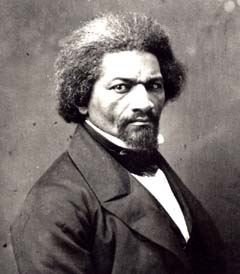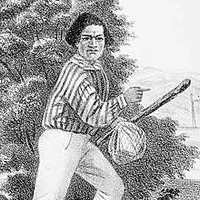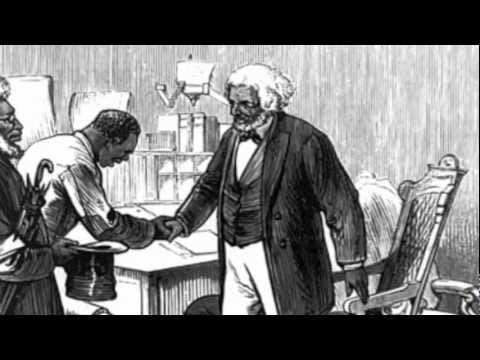 |
| (http://www.pbs.org ()) |
"If there is no struggle, there is no progress." (Douglass). Born into slavery, Frederick Douglass struggled most of his life, and soon he decided to take a stand against his burdens in his early childhood. With all his hard work and struggles, he did make great progress. Born February 14, 1817 in Tuckahoe, Maryland, Frederick Douglass was an American abolitionist who fought and took risks against slavery. He also became a motivational speaker who inspired others to fight for their freedom by speaking of his experience as a slave. Frederick Douglass is courageous by being one of the few to have the bravery to escape from slavery. Someone with courage posses ability to do something that frightens others and stand up for what's right, which is what Douglass not only did for himself, but others going through what he had to. With this courage, he transitioned into being a leader, leading meetings, movements, speeches, and everything in between in the endless fight he put up to abolish slavery. Frederick Douglass proved himself to be an American hero in many ways, with the heroic traits he possessed, that were shown through his bold actions and demonstrated courageous leadership.
 |
| (http://www.americaslibrary.gov ()) |
Frederick Douglass was courageous in ways like taking risks, escaping slavery, and teaching slaves how to read. During the time Douglass was still a slave, he describes himself as eager to end his misery of this crippling lifestyle. He wanted to escape, fully aware of the dangers of escaping and potential punishments he could receive if caught, as he states: "It would seal my fate as a slave forever. I could not hope to get off with anything less than the harshest punishment. But I remained firm, and, as I had planned, I left my chains on the third day of September, 1838" (Douglass 82). Most wouldn't risk punishment and danger, even if they knew it was the right thing to do. Douglass knew what he was in for when escaping and knew the risk he was taking. Unlike others, this didn't stop him, as he courageously fought for the people and himself by running away from the horrors of slavery. After Douglass fled from slavery, he shows his dedication to help other slaves with similar struggles as him. With this, he took another risk that could also lead him to even more punishment if caught. Douglass was helping slaves learn how to read, as it's described as, "During this time he also conducted Sabbath school, teaching other slaves how to read, a dangerous occupation. Even more dangerous were the plans Douglass was hatching to escape, hoping to steal a boat and row seventy miles to freedom." (Biography in Context). Escaping slavery was a big enough risk as it is, but to teach other slaves how to read while trying not to get caught for escaping would take more courage than anything else. Frederick Douglass defeat these odds as he escaped and taught more slaves to read all while trying not to get caught himself. This shows his fearless courage towards all who tried to overpower him, and believed he would stay a slave. Not only did Frederick Douglass have the courage to escape the dreadful vile of slavery, but he also took the risk of teaching more slaves to read. This was extremely dangerous due to slaves only supposed to be working, not getting an education. He indeed proved himself to be a courageous American hero.
Frederick Douglass was a leader to many in various different ways by having sympathy for ones like him, leading anti-slavery meetings, and motivationally speaking about abolishing slavery from experience. After Douglass escaped from slavery, he spoke of his joy for anti-slavery meetings and the way he had finally started to understand the drastic positive affects of them. He wanted freedom for not just himself, but slaves everywhere, and did all he could to abolish slavery, as he explains: "...Its sympathy for my brothers in bonds--its attacks on slaveholders, its exposures of slavery. I soon got a fairly correct idea of the principles, measures, and spirit of the anti-slavery movement. I took hold of the cause. I could do a little. What I could , I did with a joyful heart, and never felt happier than when in anti-slavery meeting" (Douglass). Some people would only care about their own slavery or benefit from getting away from or overcoming hardships, but Frederick Douglass wanted justice and freedom for himself, and slaves everywhere. Once he fled from his own hardships of slavery, he knew he had to fight for the helpless slaves who couldn't do it for themselves. With this, he led a hefty fight against the growing, continuous problem of slavery with joy and hope in his heart, being a selfless hero. Longer after Douglass escaped from slavery and started to lead revolts to abolish the problem, he delivered speeches and movements to get his word, message, and experience out to the public. This was important to him as it changed many people's perception of slavery and how much of a problem it really was. "In thousands of speeches and editorials he levied an irresistible indictment against slavery and racism, provided an indomitable voice of hope for his people, embraced antislavery politics, and preached his own brand of American ideals" (History.com). It may be hard to take into consideration the word of an escaped slave, especially one who could be caught and punished at any time. Frederick Douglass delivered many of these speeches and led many anti-slavery movements to do what he knew was right for those like him. Alone, Douglass continued to preach his ideas of freedom for all, that soon expanded to more and more people changing their opinions to pro-slavery. Leadership can be achieved in many ways. Douglass led people to believe in the dangers and inequality of slavery, and the way it should be exterminated. He led anti-slavery meetings and campaigns that would forever impact slavery abolition.
 |
| (https://1sm.info ()) |
Overall, Frederick Douglass is proved to be an American hero through his dauntless actions and courageous leadership. Not only did Frederick Douglass escape from slavery for himself, taking the risk of being caught and punished for the rebellious action, but he escaped for the greater good of slaves everywhere. He went on to lead movements to abolish slavery, speak of his dreadful experience as a slave through thousands of motivational speeches, and many more. He will forever poses a major part in the abolishment of slavery. Frederick Douglass inspires me by the way he took a risk for the greater of many others that had to suffer through exactly what he did. The way he boldly displayed his selflessness towards others and wanted freedom for everyone, not just himself. He proudly led meeting and speeches talking of his experience as a slave, to help others and make more people aware of the appalling effects of slavery. He inspires me to pursue and stand up for what I believe in, regardless of others opinions and consequences that may come with doing the right thing. Douglass will forever be remembered as a classic American hero for the sacrifices and risks he took for his people that have positively affected slavery and racism for generations.
Works Consulted
Hill, Prescott, and Frederick Douglass. Narrative of the Life of Frederick Douglass, an American Slave. Paramus, NJ, Globe Fearon, 1995
History.com Staff. "Frederick Douglass." History.com, A&E Television Networks, 2009, www.history.com/topics/black-history/frederick-douglass.
Accessed 28 Apr. 2017.
"Frederick Douglass." Authors and Artists for Young Adults, vol. 48, Gale, 2003. Biography in Context,
link.galegroup.com/apps/doc/K1603000967/BIC1?u=powa9245&xid=58ae7a7a. Accessed 28 Apr. 2017.
"Frederick Douglass." Encyclopedia of World Biography, Gale, 1998. Research in Context,
go.galegroup.com/ps/i.do?p=MSIC&sw=w&u=powa9245&v=2.1&id=GALE%7CK1631001867&it=r&asid=c2f95f9299e81b183ca68f4628a4e
77. Accessed 1 May 2017.
Page created on 5/17/2017 12:00:00 AM
Last edited 5/17/2017 12:00:00 AM
